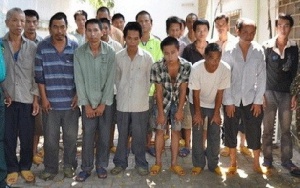Opinions of Friday, 17 May 2013
Columnist: Thompson, Kofi
China Wants Chinese In Africa To Be Socially & Environmentally Responsible
The hike in fees and tightening of the visa-rule requirements for Africans wanting to travel to China, is a subtle Chinese government immigration control measure meant to keep African economic migrants seeking greener pastures abroad out of China.
Ghana should hold frank and friendly discussions with China to do the same thing too - to keep undesirable economic migrants from China from our shores.
That will help stem the tide of economic migrants from China, now flooding into Ghana, to seek greener pastures here.
Alas, it is that type of hungry Chinese immigrant who is less likely to follow the Chinese government's new guidelines to ensure that a responsible social and environmental ethos underpins Chinese investment overseas in nations like Ghana.
Those new Chinese government guidelines are meant to ensure that Chinese investment overseas is underpinned by corporate good guidance principles.
That ought to be sweet music to the ears of hapless officials from the Ministry of Trade and Industry, the Minerals Commission, the Environmental Protection Agency and the Ghana Immigration Service - all of whom have to deal with law-breaking Chinese citizens in Ghana.
The new Chinese government guidelines should also put to rest, any fears the timid ones amongst our political elite might have harboured, that in seeking to rid Ghana of unwanted economic migrants from China, they were offending the government of China.
Such spineless politicians can rest easy. They are not biting the hand feeding them zillions of dollars in loans - by deporting the hordes of economic migrants from China, who are here to chase their dreams of riches-at-the-expense-of-witless-Africans, and in the process breaking our laws on trading; wantonly poisoning soils, streams, rivers and degrading what is left of our forest cover with impunity, in their quest for gold and timber.
Ghanaian officials can now rest easy: they are not endangering those Chinese loans with impossible conditions - attached by canny China officials to ensure that their nation's hard-earned cash does not surreptitiously end up in the offshore bank accounts of crooked Ghanaian officials: and needing to be written off someday for that reason.
Below are the Chinese government's new guidelines, which are meant to ensure that Chinese investment overseas is socially and environmentally responsible.
It is culled from the website of the NGO International Rivers(http://www.internationalrivers.org/blogs/262/beijing-sends-a-signal-to-chinese-overseas-dam-builders). Please read on:
"The Chinese Government’s “Guidelines for Environmental Protection in Foreign Investment and Cooperation” (“Guidelines”) provide civil society groups with a new source of leverage when it comes to holding Chinese companies responsible for their environmental and social impacts overseas. In the form of the new Guidelines, the Chinese government has sent a strong signal to its companies that it expects them to act responsibly and lawfully when operating overseas. The Guidelines do not specify whether Chinese investments should or should not proceed and thus may be of limited use to civil society groups seeking to oppose a Chinese sponsored or developed projects. On the other hand, the Guidelines are still government policy and can thus be a useful tool for civil society seeking to hold Chinese companies to account.
The Guidelines cover the following key issues: legal compliance, environmental policies, environmental management plans, mitigation measures, disaster management plans, community relations, waste management, and international standards. The Guidelines contain twenty-two articles; however the key articles relevant to the Chinese overseas dam building can be grouped under two categories: community dialogue and mitigating environmental impacts. It is important to recognize that these Guidelines are non-binding with “should” being the strongest expression used and “could” being the weakest.
Community Dialogue
Affected local communities feature prominently in the Guidelines, a reflection of the fact that in recent years, the lack of communication and respect for community views has been a major point of criticism of Chinese companies operating abroad. One of the very first articles of the Guidelines calls upon the companies to respect the cultural heritage of the local communities (Article 3).
While the track record of Chinese dam builders in conducting public consultations or keeping local communities informed of impacts may be poor, the Guidelines make it clear that Chinese companies need to establish a clear communication channel on environmental and social issues (Article 20). The Guidelines even suggest that companies host information workshops to communicate the project’s environmental impacts and better understand social impacts.
The Guidelines encourage companies to regularly release environmental information, including the plans and measures undertaken to comply with local laws and regulations (Article 18). This could include the disclosure of Environmental Impact Assessment Reports and Resettlement Action Plans, which to date have been difficult to obtain from Chinese dam builders.
Beyond maintaining good community relations, the Guidelines make it clear that in an emergency situation on a project site, a clear reporting and communications system should be established that includes informing the public (Article 14). An example of an emergency situation is the partial collapse of Datang’s Stung Atay Dam in Cambodia during project construction in December 2012.
Finally, the Guidelines establish that the principle of “mutual profits and benefits” should underpin how a company fulfills it responsibilities (Article 3), which could pave the way for community benefit-sharing schemes. In the case of the proposed West Seti Project in Nepal, for instance, the project developers the Government of Nepal and China’s Three Gorges Corporation have sought to address local opposition to the project by giving local populations between 2 to 5% of the equity in project (however, a Nepalese parliamentary committee originally recommended that as much as 10% of the project equity be set aside for the local population).
As Peter Bosshard observes in his blog “Holding Chinese Investors to Account,” although community relations are central, the Guidelines contain no references to the rights of communities or individuals. There is overwhelming acceptance at the international level that companies should respect human rights (e.g. UN Human Rights Council endorsed Protect, Respect and Remedy Framework), and there is evidence that Chinese companies agree with this (e.g. numerous Chinese overseas dam building companies have adopted the UN Global Compact for instance). Despite this, there remain serious examples of non-compliance or complicity by Chinese companies in appalling human rights abuses particularly in the context of resettlement, where consent from indigenous peoples are not sought (Nam Ou, Laos) and compensation is inadequate (Murum and Baram Dams, Malaysia) or remains unpaid (Patuca 3, Honduras). It would certainly be worthwhile for the Chinese government to consider in any future revisions of the Guidelines stronger regulations that prevent abuses against human rights by Chinese companies operating overseas.
Mitigating Environmental Damage
The Guidelines specify that Chinese companies must deal with project pollution or waste materials effectively (Article 10, 13, 14 and 16) through a variety of suggested measures such as environmental management plans and environmental pollution insurance. While the Guidelines do not ban Chinese companies from impacting protected areas or areas with significant environmental values (e.g. World Heritage sites, National Park), Article 15 does instruct companies to carefully consider the ecology of the local area and that damage to these areas be mitigated or restored.
The Guidelines require that environmental impact mitigation and protection measures be considered throughout the project cycle. Article 11 encourages companies to establish baseline environmental conditions (e.g. water quality, ecosystem surveys, fisheries surveys) with follow up monitoring and assessment to document the project’s impacts.
The Guidelines require that Chinese companies consider impacts on cultural heritage throughout the entire project cycle and mitigate any negative impacts (Article 9). Mitigation, however, may not be enough to protect China’s international reputation. There are certainly numerous destructive dam projects whereby the impacts cannot be mitigated or original ecosystem functions restored. The Chinese are supporting the Gibe III project in Ethiopia, which once complete, will devastate the lives of hundreds of thousands living around Lake Turkana and the Omo River, depriving them of their only water source. The project, which had languished for years, was only made possible by a loan by China’s ICBC Bank, the project’s only international source of funding. Involvement in such destructive dam projects in the future might be prevented if the Guidelines contained no-go zones and prohibition on projects with significant environmental and social impacts that cannot be mitigated.
Next steps
Even though it is unlikely that the Guidelines will translate into immediate changes at project sites, civil society groups and affected communities should start using the Guidelines right away. The Guidelines create new window for civil society to engage with Chinese companies abroad, obtain project information and documents, and hold them to a higher level of responsibility around mitigating damages. The Guidelines offer NGOs a strong tool with which to make their case for Chinese companies to respect their communities and avoid environment harm. "
End of culled article from the website of the NGO Interational Rivers (http://www.internationalrivers.org/blogs/262/beijing-sends-a-signal-to-chinese-overseas-dam-builders).
Well, there we are - from the horse's own mouth, so to speak. Thought they may be aimed specifically at dam builders in this instance, in fact they are actually meant to apply to all Chinese investment overseas.
One hopes officialdom will let it guide their policies in relation to weeding out undesirable migrants from China - and thrown at those who profit from their association with the crooks amongst Chinese migrants hustling in Ghana: and seek to protect them for that reason.
The so-called small-scale gold miners come readily to mind.
The Ghanaian media, both print and electronic, ought to widely publicise the Chinese government guidelines too - so that a majority of Ghanaians are made aware of their existence: and let it inform their attitudes to Chinese businesspeople breaking our laws.
The government of China wants its citizens here to be law-abiding and socially and environmentally responsible - and they better be, for their own individual good. A word to the wise...
Email: peakofi.thompson@gmail.com.
usly pray, that there might be a fairer world, for all its inhabitants!













